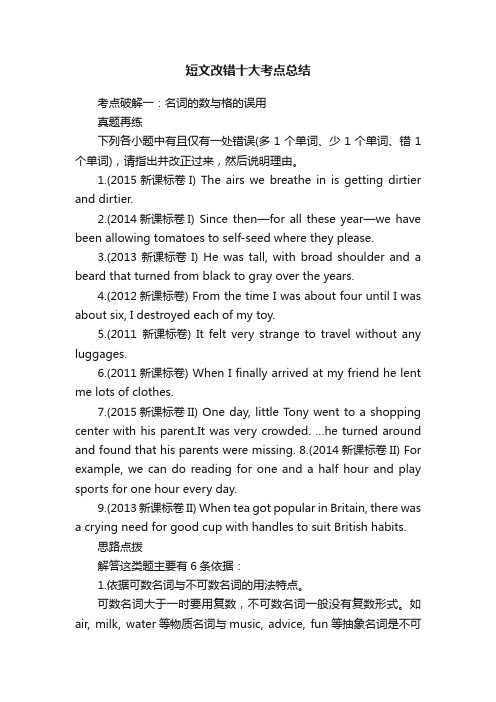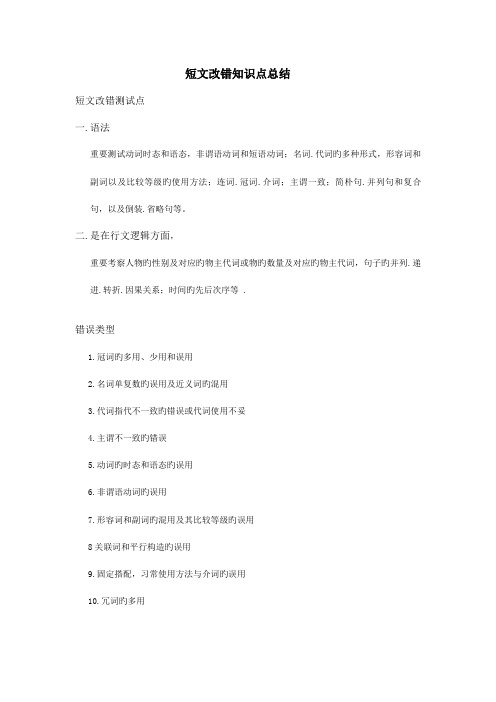短文改错考点5-连词误用、多用或少用整理总结
高考英语二轮复习短文改错考点破解-代词的误用、多用与少用

day.
us
人称与上文的we一致。
8. (2017年全国课标卷)Three years ago, Li Ming’s parents invited I to spend
me two wonderful weeks in Qingdao with them during the summer holiday.
作invited的宾语,人称代词要用宾格。
9. (2018大纲卷) Otherwise, it is impossible for him to help each other and to make their
them
friendship last long. 由help each other可知,用复数。
考点练透
1.(2018新课标卷II) Five minutes later, Tony saw parents.
his
意思是Tony看到“他的”父母,故加his。
2.(2017全国I卷) He had a deep voice,
which set himself apart from others…
2. (2020年全国Ⅲ卷) In the cafe, customers will enjoy yourselves in the historical
themselves environment that is created for them.
因本句主语是customers为第三人称, 其对应 的反身代词为 themselves, 故把 yourselves改 为themselves。
6. 其他:this, that, it的误用; anything 与everything的误用; so与such的误用, 如[真题再练]第8题;反身代词与人 称代词作宾语的误用; 形容词性物主代 词与名词性物主代词的误用; 人称代词 的主格与宾格的误用; 人称代词与物主 代词的误用, 如[真题再练]第4题。
高考短文改错常见错误归纳

高考短文改错常见错误归纳:高考中的短文改错往往是让学生感觉比拟棘手的题目,他们往往觉得虽然文章能够看得懂,但是真正找起错误来却找不出,这样的局面往往是中文式英语所造成的,下面就短文改错中的常见错误归纳如下:1.动词〔在改错中,动词的错误多半表现在错词上〕1)时态混用:例:She liked it very much and reads it to the class.( reads 改为read) Then the trouble started. We can not open the door. So we asked the policeman for help.〔can 改could〕结题技巧:拿到题目时,要注意时间提示词,多数情况下,题目往往是用过去时居多,然后在其中含有一个现在时的句子。
2)语态错用例:An English lady was finally decided that she really should learn to drive.〔去掉was〕Of course, when my mother was asked, “Have you…〞〔去掉was〕Books may be keep for four weeks.解题技巧:主动语态和被动语态的错误在改错题当中的表现不是非常明显,但是细心一些还是可以找到规律的,只需判断一下主语和谓语之间的关系是主谓还是动宾关系即可。
2.名词〔在改错中,名词的错误多半表现在错词上〕——单复数混.....,so that I’ll get good marks in all my subject. (subject改subjects)We stopped to rest for a while and to drink some waters from a stream. (waters 改water)Helen is seventeen year old. She is very busy. 〔year 改years)On the way up I was busy taking picture since the scenery was so beautiful .〔picture 改为pictures〕解题技巧:可数名词和不可数名词要分清;其次,还要注意名词前面的修饰词some,many,much,all, both, (a)few,(a) little),有时候不一定是名词错,而是前面的修饰语错。
高考英语短文改错考点归纳

高考英语短文改错考点归纳有的同学在学英语的时候,在短文改错部分总是遇到困难,那么英语短文改错有哪些考点呢?接下来是小编为大家整理的高考英语短文改错考点归纳,希望大家喜欢!高考英语短文改错考点归纳介词和动词的用法短文改错对介词的考查主要涉及在及物动词后接宾语时误加介词和在不及物动词后接宾语时漏加介词、可直接用作状语的副词短语前误加介词、介词与其他词的常用搭配、常用介词的基本用法、习语中的介词用法等。
动词考点归纳的是除动词时态与非谓语动词之外的动词考点,它包括被动语态、情态动词、动词形式的变化、动词用法辨析、动词be 的误加与漏用等。
(介词)真题单句归纳:(1) Suddenly we caught sight at a car and some men. (at 改为 of,catch sightof是习语,意为“看见”) (全国卷)(2) When I have free time I go a long walk.(go 后加 for,go for a walk是习语(全国)(3) It was very kind for them to meet me at the railway station. (for 改为of,注意句型It‘s kind of sb to do sth) (全国卷)(4) I was so tired that I fell asleep at the moment my head touched thepillow. (去掉 at,the moment 在此用作连词,相当于 as soon as)(全国卷)(5) I feel sorry to him. (to 改为 for,be / feel sorry for sb 意为“为某人感到难过”)(动词)真题单句归纳(1)Books may be keep for four weeks. (keep 改为 kept,因此处要用被动语态(全国)(2) They eager to know everything about China and asked me lots ofquestions. (eager 前加were,因此处缺谓语动词) (全国卷)(3) I‘d like to your pen-friend, and get to know more about your country.(to 后加 be / become,因 would like后要接不定式,根据句意此处应加 be / become)(全国卷)(4) There will an important game next month. (will 后加be,此处缺谓语动词)(5)We were all left home at an early age.(去掉were,因句中已有谓语动词left,“我们离开家”又是主动,不能再加be) (天津卷)代词考点1、定语从句中的名词已由关系代词取代,再用代词则是多余的。
高考英语短文改错常见错误类型汇总

常见错误类型高考英语改错题是考生感到棘手的题型之一。
笔者对近几年的高考英语改错题作了细致的分析并加以归类后,发现错误类型主要集中在以下方面。
(例题保留原题号)1. 动词时态每年都有时态错误的小题,而且改动基本集中在一般过去时与一般现在时之间。
时态的更改要以上下文的主体时态为依据。
(1)(2003全国卷)She liked it very much and reads it to the class. All said the story was... 84. read(and连接并列谓语)(2)(2004江苏卷)At once I apologize and controlled myself... 83. apologized(and连接并列谓语)(3)(2004全国卷)Sometimes, we talked to each other very well in class,... 82. talk(根据sometimes可判断此句为一般现在时)(4)(2005全国卷Ⅱ)I will write again and send you the photos we take together. 85. took(把照片寄给你,应该是已经拍好的,用过去时)(5)(2005全国卷Ⅰ)There are advantage for students to work while studying at school. One of them was that they can earn money. 77. is(从上下文判断,应该是现在时,谓语用is)(6)(2005江苏卷)We named him Jack and keep him for about three years. 76. kept(and连接并列谓语)2. 名词单复数单复数互改是高考英语改错题的基本题型之一,改动的依据有:一是根据名词前的修饰限定成份;二是根据上下文的逻辑关系。
高考英语短文改错答题技巧总结

高考英语短文改错答题技巧总结高考英语短文改错答题技巧1、考生必须熟悉设错方式:多词、少词、错词。
⑴多词现象大多出现在冠词、介词、助动词、连词、语义重复及行文逻辑等方面。
⑵少词现象主要出现在冠词、介词、副词、助动词、不定式符号to、连词等。
⑶错词现象主要在冠词、介词、名词单复数、动词时态、非谓语动词、主谓一致、代词、连词、词形。
2、考生平时应加强基本功训练,用一个“错题集”本把自己或同学在书面表达中出现的错误归纳一下,以便考前复习。
对全文的宏观把握学生应把改错内容当作一篇小短文来理解,这样能对短文有个宏观把握,对上下文有全面的了解。
在理解篇章的基础上逐句审读,分析判断,上下兼顾,把明显的、拿的准的题先做完,这样可以缩小包围圈,也有助于对全文的进一步理解。
高考英语七选五的作答技巧做七选五题目的时候边读边做。
各个问题附近的句子都需要重点阅读,圈画一些线索粗,再从选项中寻找相关的特征词用来判断正确答案。
带入排除法也是一种很好的方法。
做完七选五后,通读全文。
将所选项放入空白处,通读一遍,看看是否与上下文构成语义及逻辑上的直接关系,是否符合该处语境。
1、在七选五阅读过程中,重要要关注*的首段与末段。
尤其是*的这两段的末尾句,因为“开门见山”与“末尾点题”的写作方式是最为常见的,首段的末句一般是全文的主题所在,说明*将探讨哪些内容,并简要指出*的写作思路,有时甚至会以提纲的形式进行呈现。
七选五首段的末句对于快速掌握*的主题具有重要意义,如果它是*的主题句,就可以使读者迅速明确*情节将如何展开,并对*的写作主题有了整体的了解。
如果末句不是主题句,则需要继续寻找。
这时,可以考虑*的写作方式是否为“结尾总结”式,如两者均可排除,则需在*中其他段落寻找主题句,但要注意首段与末段的提示作用。
2、做七选五题目的时候边读边做。
各个问题附近的句子都需要重点阅读,圈画一些线索粗,再从选项中寻找相关的特征词用来判断正确答案。
带入排除法也是一种很好的方法。
短文改错十大考点总结

短文改错十大考点总结考点破解一:名词的数与格的误用真题再练下列各小题中有且仅有一处错误(多1个单词、少1个单词、错1个单词),请指出并改正过来,然后说明理由。
1.(2015新课标卷I) The airs we breathe in is getting dirtier and dirtier.2.(2014新课标卷I) Since then—for all these year—we have been allowing tomatoes to self-seed where they please.3.(2013新课标卷I) He was tall, with broad shoulder and a beard that turned from black to gray over the years.4.(2012新课标卷) From the time I was about four until I was about six, I destroyed each of my toy.5.(2011新课标卷) It felt very strange to travel without any luggages.6.(2011新课标卷) When I finally arrived at my friend he lent me lots of clothes.7.(2015新课标卷II) One day, little Tony went to a shopping center with his parent.It was very crow ded. …he turned around and found that his parents were missing. 8.(2014新课标卷II) For example, we can do reading for one and a half hour and play sports for one hour every day.9.(2013新课标卷II) When tea got popular in Britain, there wasa crying need for good cup with handles to suit British habits.思路点拨解答这类题主要有6条依据:1.依据可数名词与不可数名词的用法特点。
短文改错常见设错点

七、时态、语态和主谓一致(一般现在时与一般过去 时态、语态和主谓一致( 的区别,一般有明显的提示,比如前后时态一致; 的区别,一般有明显的提示,比如前后时态一致;与 时间状语一致。语态就是主被动的混用。 时间状语一致。语态就是主被动的混用。)
1.We choose the cheapest biscuits and ate them chose under a tree. 2.Should students make friends on line? Some people think the Internet help make many helps friends . 3.Our city is a modern city. It set up in the early 1980s. was
短文改错 (10分) 分
常见设错点? 常见设错点? 设错点
一、名词(主要是可数名词单复数误用; 名词(主要是可数名词单复数误用; 或者不可数名词误加s。) 或者不可数名词误加 。) 1.Both my parent miss you a lot . parents 2.Now people get a lot of informations from TV. information 3. Miss Zhang is one of the most popular teacher teachers in our school.
3. What is known to us all is that China is a great country with a long history.表语从句 4. We all know that China is a great country 宾语从句 with a long history.
2023年短文改错知识点总结

短文改错知识点总结短文改错测试点一.语法重要测试动词时态和语态,非谓语动词和短语动词;名词.代词旳多种形式,形容词和副词以及比较等级旳使用方法;连词.冠词.介词;主谓一致;简朴句.并列句和复合句,以及倒装.省略句等。
二.是在行文逻辑方面,重要考察人物旳性别及对应旳物主代词或物旳数量及对应旳物主代词,句子旳并列.递进.转折.因果关系;时间旳先后次序等 .错误类型1.冠词旳多用、少用和误用2.名词单复数旳误用及近义词旳混用3.代词指代不一致旳错误或代词使用不妥4.主谓不一致旳错误5.动词旳时态和语态旳误用6.非谓语动词旳误用7.形容词和副词旳混用及其比较等级旳误用8关联词和平行构造旳误用9.固定搭配,习常使用方法与介词旳误用10.冗词旳多用设错方式一、动词形1.动词旳时态和语态错误2.主、谓不一致旳错误3.谓语与非谓语误用4.非谓语动词旳误用动词置于句首•首先看有无并列连词and /or /otherwise, 有就考虑是祈使句•没有,就考虑非谓语动词•再看有无(,),有就考虑分词作状语,没有就考虑动名词/不定式作主语例Review what happened in the past helps me succeed in the future. Reviewing常接不定式旳形容词•be glad to do•be eager to do•be anxious to•be ready to do及物动词后有by,in,with,to•先辨是谓语还是非谓语,考虑被动语态和过去分词•be located /situated in位于•be absorbed in被…吸引/专心于•be involved in参与/牵涉到/专心于•be lost in沉迷于•be mixed with与…混合•be covered with为…覆盖•be lined with排列•be surrounded with围绕•be faced with面临•be combined with 联合•be connected with联络•be compared to /with与…相比•be addicted to沉迷于•be related to与…有关系无被动语态旳动词•不及物动词没被动语态,不接宾语,非谓语动词常用ing •happen /take place /occur•lie /exist•date from /back to•belong to•consist of•die•sound /look /feel /taste /smell练习1.I moved by their encouraging words and I studied even harder.was 2.Facing with many problems, the new government is having a hard time. Facted3.Bury in his work, Tom didn’t notice me enter the room.Buried 4.Locating in a beautiful and quiet neighborhood, our large fully-equipped Locatedapartment meets all their needs. 5.We were driving in the country when the car stop working.stopped 6.Mary ,as well as her sisters study Chinese in China.studies 7.I saw the boys played games on the bank of the lake when I passed. playing8.I particularly enjoyed driving through the countryside with you and saw theseeing changing colors of the leaves on the trees.9.Why you think so many people still suffer from poverty now? ^ ^do主谓一致•动名词/不定式/主语从句作主语•many /many a•The number of与A number of•some /the rest /分数 /百分数 + n•not only…but also /either…or /neither…nor只能使用过去时旳时间状语•last week /year /night•just now•the other day^ •in the past•yesterday例Last Saturday, our school had organized all of the Senior I students tovisit the children at a local orphanage二、名词数•可数与不可数、单复数错用•名词旳格旳误用•前后修饰语旳误用•名词前冠词旳误用不可数名词前旳修饰语•只能接不可数:little, much, a great deal of, a great /large amount of •接可数与不可数:some, any, a lot of /lots of• a piece of必须接复数旳修饰语•many•few• a large /great number of•large /great numbers of•these•those•several例The food was wonderful with reasonable prices, and we enjoyed several local dish.dishes•baggage /luggage行李•damage损害•furniture家俱•equipment设备•weather天气•money金钱•advice忠告•information信息•news消息•knowledge知识•change零钱•experience经验•food食物•bread面包•beer啤酒•wine葡萄酒•coffee咖啡•tea茶•milk牛奶•water水•do damage /harm /good to•get /be close to nature•protect the environment•send sth into space•the universe•make progressof + 抽象名词•importance•significance•value•help •juice饮料•cloth布•clothing衣服•paper纸•use•interest•have /find /feel interest in•with pleasure /joy /delight•be in trouble /difficulty•be in danger•with difficulty•in surprise /anger•take pride in例Apart from the convenient public transportation, our own car can also take them to some nearby places of interests.interest抽象名词详细化•danger(危险)→a danger(一件危险旳事或一种危险旳人)•experience经验→an experience一次经历•failure失败→a failure一位失败者,一件失败旳事•success成功→a success一位成功者,一件成功旳事•knowledge知识→a good knowledge对……精通/熟知•surprise惊奇→a surprise一件令人吃惊旳事•pleasure快乐→a pleasure一件快乐旳事例He was a complete failure as a teacher, but he has made great success ofhis business.必须用复数•make friends /enemies with•one of my friends•in public places必须用单数•have a good command /knowledge of 特殊名词旳修饰语•price /cost•sth•population•number•high /low•cheap /expensive•large /small•(many错)不带冠词旳名词•go to school•at school•go to church•at church•send sb to hospital•in hospital•throw /put sb in prison•in prison•work in a school /a hospital /a prison•go to the school /the hospital to see sb•have lunch /breakfast /supper•have /find /feel interest in•to one’s surprise /joy /delighta & an•an hour•an honest man• a university student• a one-year-old boy• a useful book练习1.We can find a lot of informations on the Internet.information2.Different people speak different language. languages3.The man is a friend of my father.father’s4.I won ’t take this jacket, for its price is very expensive.high5.When a child is five in England or Wales, his parents must send him to the school .6.After a hour or so we began to feel very frightened .an7.An American and a Frenchman decided to cross the sea between France and England in the balloon in 1784 .a8.I gained so much confidence that I went back to school as new person . a9.With coming of spring, grass and trees turn green .the 三、形容词和副词看修饰语 • 形容词和副词旳误用• 原级,比较级和最高级旳误用。
- 1、下载文档前请自行甄别文档内容的完整性,平台不提供额外的编辑、内容补充、找答案等附加服务。
- 2、"仅部分预览"的文档,不可在线预览部分如存在完整性等问题,可反馈申请退款(可完整预览的文档不适用该条件!)。
- 3、如文档侵犯您的权益,请联系客服反馈,我们会尽快为您处理(人工客服工作时间:9:00-18:30)。
present it.
and
因“写一个故事”与“将它交上去”是先后 两个动作,顺承关系,而不是选择关系。
9. (2008大纲卷II) Finally, I should be
able to tell visitors about our history
or culture and show them our great and achievements. 要告诉外宾的应是“历史与文化”, 而非“历史或文化”。
17. (2012大纲卷II)I think, we should first go
all out to plant trees though trees will help
save water.
because /since/as
树能保水是种树的原因。
18. (2011大纲卷I) Since the lunch bell finally When
if 意为“如果”你能来参加,我们非常感激。
15. (2014大纲卷)And it is wise to have as many good friends that we can.
as 固定句式as…as…
16. (2013大纲卷)This is how I need to improve in the future. what 引导表语从句并作improve的宾语。
what
引导宾语从句并在从句中作主语, 表示 “所……的事(the thing that)”, 故用what。
6.(2011新课标卷) I bought my ticket but and
turned around to pick up my bag from the
floor, and then I realized that someone had stolen it. 因“买票”与“转身”是先后紧接着发生的 两个动作,是顺承关系,无转折意义,故用 and。
3. 牢记平行结构。请翻译下列连词:
(1) 或者……或者…… e_i_t_h_e_r_…__o_r_…__________
(2) 既不……也不…… n__ei_t_h_e_r_…__n_o_r_…________ (3) 不但……而且…… n__o_t _o_n_ly_…__b_u__t _a_ls_o_…____
and
因“空气新鲜”与“山绿”是并列关系,而 非选择关系。
2.(2014新课标卷I) Although we allow tomato plants to grow in the same place year after year, but we have never had
也可以改but为yet any disease or insect attack problems.
my classmates away during they came over when
to play or do homework with me.
因during是介词,不能引导从句,应改为连 词;从句意来看,应改为引导时间状语从 句的when。
5.(2012新课标卷) But before long, they began to see which was happening.
that burn less oil.
因once or twice(一两次,偶尔)是固定词组。
8. (2010大纲卷I) It was a chance of a lifetime
to win the first prize in the Story Writing
Show. All I had to do was to write a story or
and
因“拿起来”与“宣布”是顺承关系,不 是转折关系。
2. (2008新课标卷) More than 1 000
paintings will be on show, but high and
school students from all the eight
districts will come to the event. 前后没有转折的意思。
held up on my way back.
but
因“打算四点前还”与“被阻在路上”是
转折关系。
7. (2012大纲卷I) What’s more, we can
go to work by bike once and twice a or
week, and we can also buy smaller cars
10. (2011大纲卷I) Now Aigulie and I
study at different colleges or we can and
only see each other during the summer vacation.
因“在不同学校学习”与“只能在暑期见 面”不是选择关系而是顺承的并列关系。
考点练透
下列各小题中有且仅有一处错误(多1个单
词、少1个单词、错1个单词),请指出并
改正过来,然后说明理由。
1. (2010新课标卷) Without a moment’s
delay, his neighbor picked up the box but
announced “I’ll take them.”
11. (2012大纲卷II) Water is important. We,
as well as animals, cannot live without water
and neither agriculture or industry can go
without it.
nor
固定搭配:neither…nor…
思路点拨
1. 句间无连词,增加连词。凡是两个 句子之间没有句号、分号,又没有连 词时,一定是漏掉连词了,要根据两 句之间的意义关系或虽然同一句子 中的两个主谓关系之间一定有连词,但又 不能多,只需一个,多了就错了。特别是 受汉语的影响,易将although /though… but(虽然……但是……), because /since/ as…so (因为……所以……)连用,遇到此 种情况,一般删除后面的but, so, 以免影响 一个句子的第一个单词首字母大写的原则。
7. (2015新课标卷II) After looking at the toy for some time, he turned around and found where his parents were missing.
that
或删除where因found后是宾语从句,意为 “他的父母不见了”,其结构与意义完整了, 用that引导或省略that。
12. (2009新课标卷)I’m going to attend
my first lesson this afternoon, for I’ve so
got some preparations to make. Keep in touch.
前句是因后句是果,用连词so (因此, 所以)。
13. (2009新课标卷) No lectures this
因but不与although连用,须删除其中之 一;又因删除Although,we不是大写字 母开头,所以只能删除but;也可以改 but为yet。
3.(2013新课标卷I) He had a deep voice, which set him apart from others in our small town, he was strong and powerful.
3. (2007新课标卷)Last year I was ill but had
to stay in hospital for a week.
and
因“生病”与“住院”是顺承关系,并非转
折关系。
4. (2014大纲卷)The more friends we have, the more we can learn from one another, but the more pleasure we can share together. and 前后不是转折关系。
(2)but与and混用。如[真题再练]6。 (3)but与although连用。如[真题再练]2。 (4)并列连词漏用。如[真题再练]3。
2. 从句的引导词的误用
(1)误用从句连词。如[真题再练] 5、7。
(2)误用that来引导非限制性定语从 句。如[真题再练]8。
(3) 介词误作连词用。如[真题再练] 4,during误作when。易混的还有表 示“随着”的介词with与连词when; 表示“在……期间”的介词during与 连词while。介词一般是接名词、代词 或动名词作宾语,而连词才可以连接 句子。
考点5: 连词误用、多用或少用
真题再练
下列各小题中有且仅有一处错误(多1个单词、 少1个单词、错1个单词),请指出并改正过来, 然后说明理由。 1.(2015新课标卷I) In the countryside, the air is clean or the mountains are green.
3. 遇到连词要考究是否用错。如or (表选择), and (表顺承), but (表转折) 之间是否用错,要根据句意的理解、 前后的逻辑关系去判断。
考点归纳
除2013年卷I考了2道题,2014年卷 II没有考查连词外,每年有1道题考查连 词。在最近5年8套题中考了8道题,已考 的具体考点有:
1. 并列连词的误用 (1)or与and混用。如[真题再练]1。
(4) 不是……而是…… n__o_t…__b_u_t_…____________ (5) 不论……还是…… w__h_e_t_h_e_r…__o_r_…_________
